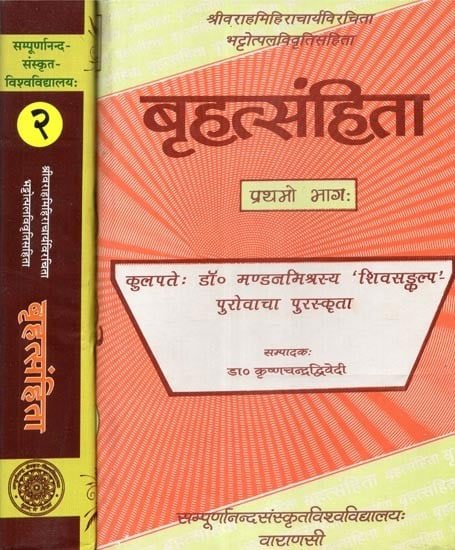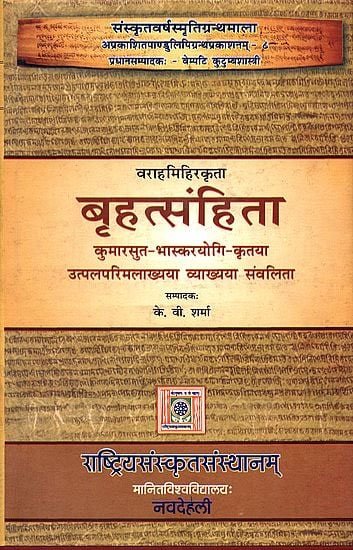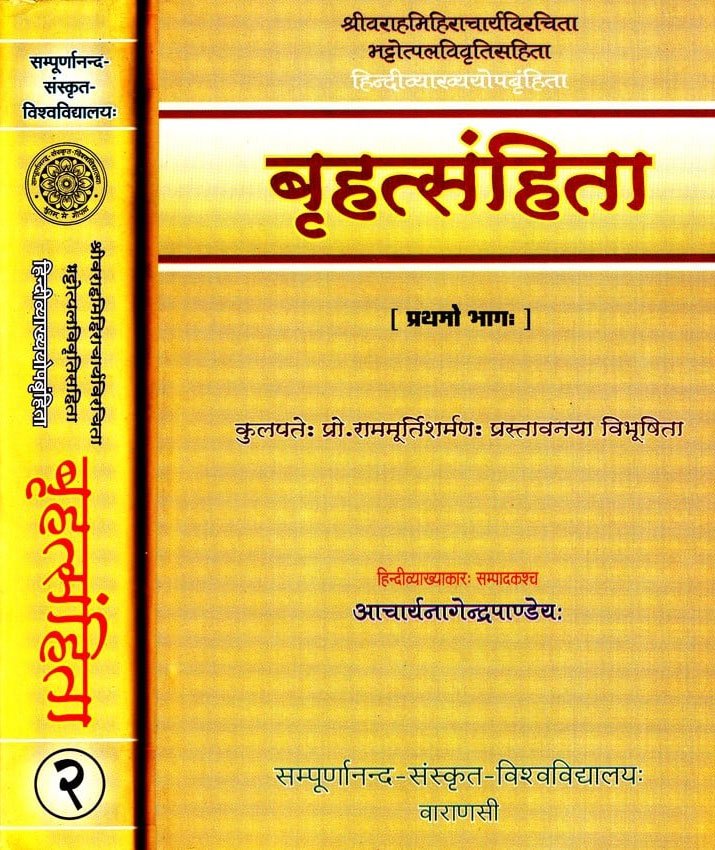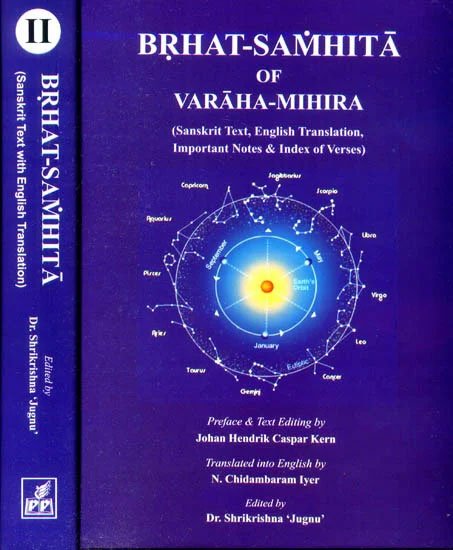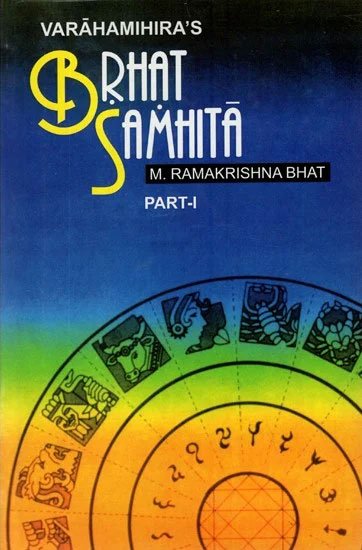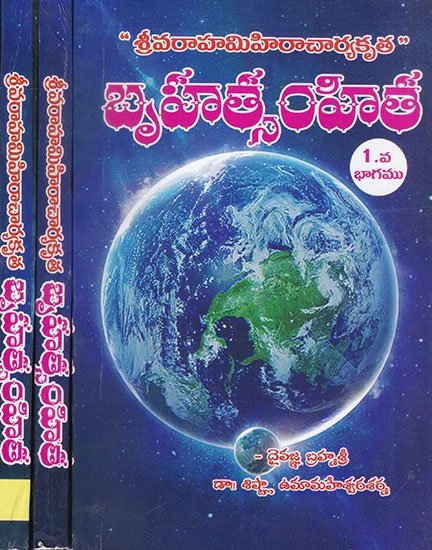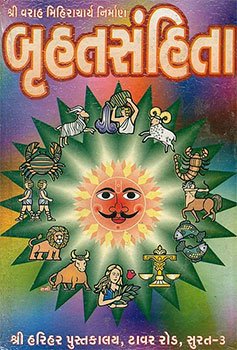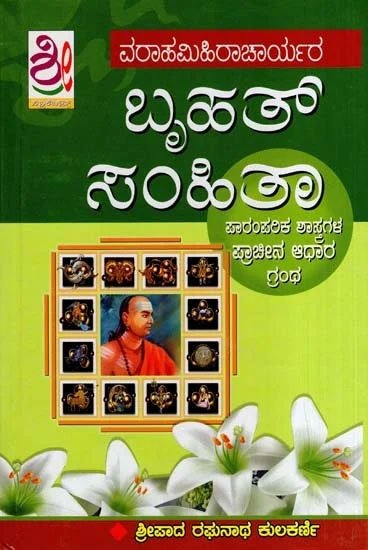Brihat-samhita [sanskrit]
26,560 words
The Sanskrit text of the Brihat-samhita from the 6th-century authored by Varaha Mihira in present-day Ujjain, India. It primarily deals with astrology and astronomy but is presented as an encyclopedia of knowledge.
Verse 27.7
आषाढीपर्वकाले यदि किरणपतेरस्तकालोपपत्तौ वायव्यो वृद्धवेगः पवनघनवपुः पन्नगार्द्धानुकारि ।
जानीयाद्वारिधाराप्रमुदितमुदितामुक्तमण्डूककण्ठां सस्योद्भासैकचिह्नां सुखबहुलतया भाग्यसेनामिवोर्वीम् ॥ ७ ॥
[प्लवति धनरिपुः पन्नगादानुकारी । मुदितां मुक्त]
āṣāḍhīparvakāle yadi kiraṇapaterastakālopapattau vāyavyo vṛddhavegaḥ pavanaghanavapuḥ pannagārddhānukāri |
jānīyādvāridhārāpramuditamuditāmuktamaṇḍūkakaṇṭhāṃ sasyodbhāsaikacihnāṃ sukhabahulatayā bhāgyasenāmivorvīm || 7 ||
[plavati dhanaripuḥ pannagādānukārī | muditāṃ mukta]
The Sanskrit text of Verse 27.7 is contained in the book Brihata Samhita (Sanskrit Text with Hindi Translation) by Pandit Achyutananda Jha. This book is available online or you could buy the latest edition:
Read online Buy now! The Sanskrit text by Pandit Achyutananda Jha (2001)
Glossary of Sanskrit terms
Note: This extracts Sanskrit terms and links to English definitions from the glossary, based on an experimental segmentation of verse (27.7). Some terms could be superfluous while some might not be mentioned. Click on the word to show English definitions.
Ashadhi, Parvakala, Yadi, Yad, Kiranapati, Astaka, Alopa, Patti, Patta, Pattu, Vayavi, Vayavya, Vriddhavega, Pavana, Ghana, Vapu, Vapus, Pannaga, Arddha, Anukarin, Anukari, Varidhara, Udita, Ukta, Manduka, Kantha, Sasya, Udbhasa, Aika, Cihna, Sukha, Bahulata, Bhagya, Sena, Iva, Urvi, Plavat, Dhana, Ripu, Anu, Kari, Karin,
Analysis of Sanskrit grammar
Note: this is an experimental feature and only shows the first possible analysis of the Sanskrit text (Verse 27.7). If the system was successful in segmenting the sentence, you will see of which words it is made up of, generally consisting of Nouns, Pronouns, Verbs, Participles and Indeclinables. Click on the link to show all possible derivations of the word.
- Line 1: “āṣāḍhīparvakāle yadi kiraṇapaterastakālopapattau vāyavyo vṛddhavegaḥ pavanaghanavapuḥ pannagārddhānukāri ”
- āṣāḍhī -
-
āṣāḍhī (noun, feminine)[compound], [nominative single]āṣāḍhi (noun, masculine)[nominative dual], [vocative dual], [accusative dual]
- parvakāle -
-
parvakāla (noun, masculine)[locative single]
- yadi -
-
yadi (indeclinable conjunction)[indeclinable conjunction]yadi (indeclinable relative)[indeclinable relative]yadi (indeclinable)[indeclinable]yad (noun, masculine)[locative single]
- kiraṇapater -
-
kiraṇapati (noun, masculine)[ablative single], [genitive single]
- astakā -
-
astaka (noun, masculine)[compound], [vocative single]astaka (noun, neuter)[compound], [vocative single]
- alopa -
-
alopa (noun, masculine)[compound], [vocative single]
- pattau -
-
patti (noun, feminine)[locative single]patti (noun, masculine)[locative single]√pad -> patta (participle, masculine)[nominative dual from √pad class 1 verb], [vocative dual from √pad class 1 verb], [accusative dual from √pad class 1 verb]√pat -> patta (participle, masculine)[nominative dual from √pat class 4 verb], [vocative dual from √pat class 4 verb], [accusative dual from √pat class 4 verb]pattu (noun, masculine)[locative single]pattu (noun, feminine)[locative single]
- vāyavyo* -
-
vāyavī (noun, feminine)[nominative plural], [vocative plural]vāyavya (noun, masculine)[nominative single]
- vṛddhavegaḥ -
-
vṛddhavega (noun, masculine)[nominative single]
- pavana -
-
pavana (noun, masculine)[compound], [vocative single]pavana (noun, neuter)[compound], [vocative single]
- ghana -
-
ghana (noun, masculine)[compound], [vocative single]ghana (noun, neuter)[compound], [vocative single]
- vapuḥ -
-
vapus (noun, masculine)[compound], [adverb], [nominative single], [vocative single]vapus (noun, neuter)[compound], [adverb], [nominative single], [vocative single], [accusative single]vapu (noun, feminine)[nominative single]vapu (noun, masculine)[nominative single]
- pannagā -
-
pannaga (noun, masculine)[compound], [vocative single]pannagā (noun, feminine)[nominative single]
- ārddhā -
-
ārddha (noun, neuter)[compound], [vocative single]
- anukāri -
-
anukārin (noun, masculine)[compound], [adverb]anukārin (noun, neuter)[compound], [adverb], [nominative single], [vocative single], [accusative single]anukārī (noun, masculine)[compound], [adverb]anukārī (noun, feminine)[compound], [adverb], [vocative single]anukārī (noun, neuter)[compound], [adverb], [nominative single], [vocative single], [accusative single]
- Line 2: “jānīyādvāridhārāpramuditamuditāmuktamaṇḍūkakaṇṭhāṃ sasyodbhāsaikacihnāṃ sukhabahulatayā bhāgyasenāmivorvīm || 7 |”
- jānīyād -
-
√jñā (verb class 9)[optative active third single]
- vāridhārā -
-
vāridhāra (noun, masculine)[compound], [vocative single]vāridhārā (noun, feminine)[nominative single]
- apramuditam -
-
apramuditā (noun, feminine)[adverb]
- uditām -
-
uditā (noun, feminine)[accusative single]√vad -> uditā (participle, feminine)[accusative single from √vad class 1 verb]
- ukta -
-
ukta (noun, masculine)[compound], [vocative single]ukta (noun, neuter)[compound], [vocative single]√vac -> ukta (participle, masculine)[vocative single from √vac class 2 verb], [vocative single from √vac class 3 verb]√vac -> ukta (participle, neuter)[vocative single from √vac class 2 verb], [vocative single from √vac class 3 verb]
- maṇḍūka -
-
maṇḍūka (noun, masculine)[compound], [vocative single]maṇḍūka (noun, neuter)[compound], [vocative single]
- kaṇṭhā -
-
kaṇṭha (noun, masculine)[compound], [vocative single]√kaṇṭh (verb class 1)[imperative active second single]
- am -
-
a (noun, masculine)[adverb], [accusative single]ā (noun, feminine)[adverb]e (noun, masculine)[accusative single]
- sasyo -
-
sasya (noun, masculine)[compound], [vocative single]sasya (noun, neuter)[compound], [vocative single]√sas -> sasya (absolutive)[absolutive from √sas]sa (noun, neuter)[genitive single]
- udbhāsai -
-
udbhāsa (noun, masculine)[compound], [vocative single]
- aika -
-
aika (noun, masculine)[compound], [vocative single]aika (noun, neuter)[compound], [vocative single]
- cihnām -
-
cihnā (noun, feminine)[accusative single]
- sukha -
-
sukha (noun, masculine)[compound], [vocative single]sukha (noun, neuter)[compound], [vocative single]
- bahulatayā -
-
bahulatā (noun, feminine)[instrumental single]
- bhāgya -
-
bhāgya (noun, masculine)[compound], [vocative single]bhāgya (noun, neuter)[compound], [vocative single]
- senām -
-
senā (noun, feminine)[accusative single]
- ivo -
-
iva (indeclinable adverb)[indeclinable adverb]iva (indeclinable)[indeclinable]
- urvīm -
-
urvī (noun, feminine)[accusative single]
- Cannot analyse 7
- Line 3: “[plavati dhanaripuḥ pannagādānukārī ”
- plavati -
-
√plav -> plavat (participle, masculine)[locative single from √plav class 1 verb]√plav -> plavat (participle, neuter)[locative single from √plav class 1 verb]√plav (verb class 1)[present active third single]
- dhana -
-
dhana (noun, masculine)[compound], [vocative single]dhana (noun, neuter)[compound], [vocative single]√dhan (verb class 1)[imperative active second single]
- ripuḥ -
-
ripu (noun, masculine)[nominative single]ripu (noun, feminine)[nominative single]
- pannagād -
-
pannaga (noun, masculine)[adverb], [ablative single]
- ānu -
-
ānu (noun, masculine)[compound], [adverb]ānu (noun, neuter)[compound], [adverb], [nominative single], [vocative single], [accusative single]ānu (noun, feminine)[compound], [adverb]
- kārī -
-
kārī (noun, feminine)[compound], [nominative single]kāri (noun, feminine)[nominative dual], [vocative dual], [accusative dual]kāri (noun, masculine)[nominative dual], [vocative dual], [accusative dual]kārin (noun, masculine)[nominative single]
Other editions:
Also see the following editions of the Sanskrit text or (alternative) English translations of the Verse 27.7
Brhatsamhita with the Commentary of Bhattotpala
by Krishna Chandra Dwivedi (2016)
Publisher: Sampurnanand Sanskrit University; 1229 pages;
Buy now!
Brihat Samhita with the Commentary of Utpalapatimala of Yogisvara
by K. V. Sharma (2012)
Publisher: Rashtriya Sanskrit Sansthan, Janakpuri; 754 pages; ISBN-10; 8186111360; ISBN-13: 9788186111369
Buy now!
Brihat Samhita (Hindi Translation)
by K. V. Sharma (2002)
Publisher: Sampurnanand Sanskrit University; 2359 pages; ISBN-13: 9789387890008.
Buy now!
Brhat Samhita (English translation)
by N. Chidambaram Iyer (2022)
Publisher: Parimal Publication Pvt. Ltd.; 801 pages; Edited by Dr. Shrikrishna Jugnu; ISBN-10: 8171104215; ISBN-13: 9788171104215.
Buy now!
Brhat Samhita (English with notes)
by M. Ramakrishna Bhat (2010)
Publisher: Motilal Banarsidas Publishers Pvt. Ltd.; 1155 pages; ISBN-10: 8120810600; ISBN-13: 9788120810600.
Buy now!
Brhat Samhita (Telugu translation)
by Sishtla Umamaheswara Sharma (2020)
Publisher: Mohan Publications, Andhra Pradesh; 846 pages.
Buy now!Preview of verse 27.7 in Kannada sript:
ಆಷಾಢೀಪರ್ವಕಾಲೇ ಯದಿ ಕಿರಣಪತೇರಸ್ತಕಾಲೋಪಪತ್ತೌ ವಾಯವ್ಯೋ ವೃದ್ಧವೇಗಃ ಪವನಘನವಪುಃ ಪನ್ನಗಾರ್ದ್ಧಾನುಕಾರಿ ।
ಜಾನೀಯಾದ್ವಾರಿಧಾರಾಪ್ರಮುದಿತಮುದಿತಾಮುಕ್ತಮಣ್ಡೂಕಕಣ್ಠಾಂ ಸಸ್ಯೋದ್ಭಾಸೈಕಚಿಹ್ನಾಂ ಸುಖಬಹುಲತಯಾ ಭಾಗ್ಯಸೇನಾಮಿವೋರ್ವೀಮ್ ॥ ೭ ॥
[ಪ್ಲವತಿ ಧನರಿಪುಃ ಪನ್ನಗಾದಾನುಕಾರೀ । ಮುದಿತಾಂ ಮುಕ್ತ]
Brhat Samhita (Gujarati translation)
by - (2000)
Publisher: Shree Harihar Pustakalay, Surat; Author: Shri Varahamihira Acharya (શ્રી વરાહમિહીરાચાર્ય); 432 pages.
Buy now!Preview of verse 27.7 in Gujarati sript:
આષાઢીપર્વકાલે યદિ કિરણપતેરસ્તકાલોપપત્તૌ વાયવ્યો વૃદ્ધવેગઃ પવનઘનવપુઃ પન્નગાર્દ્ધાનુકારિ ।
જાનીયાદ્વારિધારાપ્રમુદિતમુદિતામુક્તમણ્ડૂકકણ્ઠાં સસ્યોદ્ભાસૈકચિહ્નાં સુખબહુલતયા ભાગ્યસેનામિવોર્વીમ્ ॥ ૭ ॥
[પ્લવતિ ધનરિપુઃ પન્નગાદાનુકારી । મુદિતાં મુક્ત]
Brhat Samhita (Kannada translation)
by Sripada Raghunatha Kulkarni (2021)
Publisher: Srinidhi Publications, Bangalore; 668 pages with illustrations.
Buy now!Preview of verse 27.7 in Kannada sript:
ಆಷಾಢೀಪರ್ವಕಾಲೇ ಯದಿ ಕಿರಣಪತೇರಸ್ತಕಾಲೋಪಪತ್ತೌ ವಾಯವ್ಯೋ ವೃದ್ಧವೇಗಃ ಪವನಘನವಪುಃ ಪನ್ನಗಾರ್ದ್ಧಾನುಕಾರಿ ।
ಜಾನೀಯಾದ್ವಾರಿಧಾರಾಪ್ರಮುದಿತಮುದಿತಾಮುಕ್ತಮಣ್ಡೂಕಕಣ್ಠಾಂ ಸಸ್ಯೋದ್ಭಾಸೈಕಚಿಹ್ನಾಂ ಸುಖಬಹುಲತಯಾ ಭಾಗ್ಯಸೇನಾಮಿವೋರ್ವೀಮ್ ॥ ೭ ॥
[ಪ್ಲವತಿ ಧನರಿಪುಃ ಪನ್ನಗಾದಾನುಕಾರೀ । ಮುದಿತಾಂ ಮುಕ್ತ]
![Brihat-samhita [sanskrit] - book cover](/uploads/a/Brihat-Samhita-Sanskrit.jpg)
